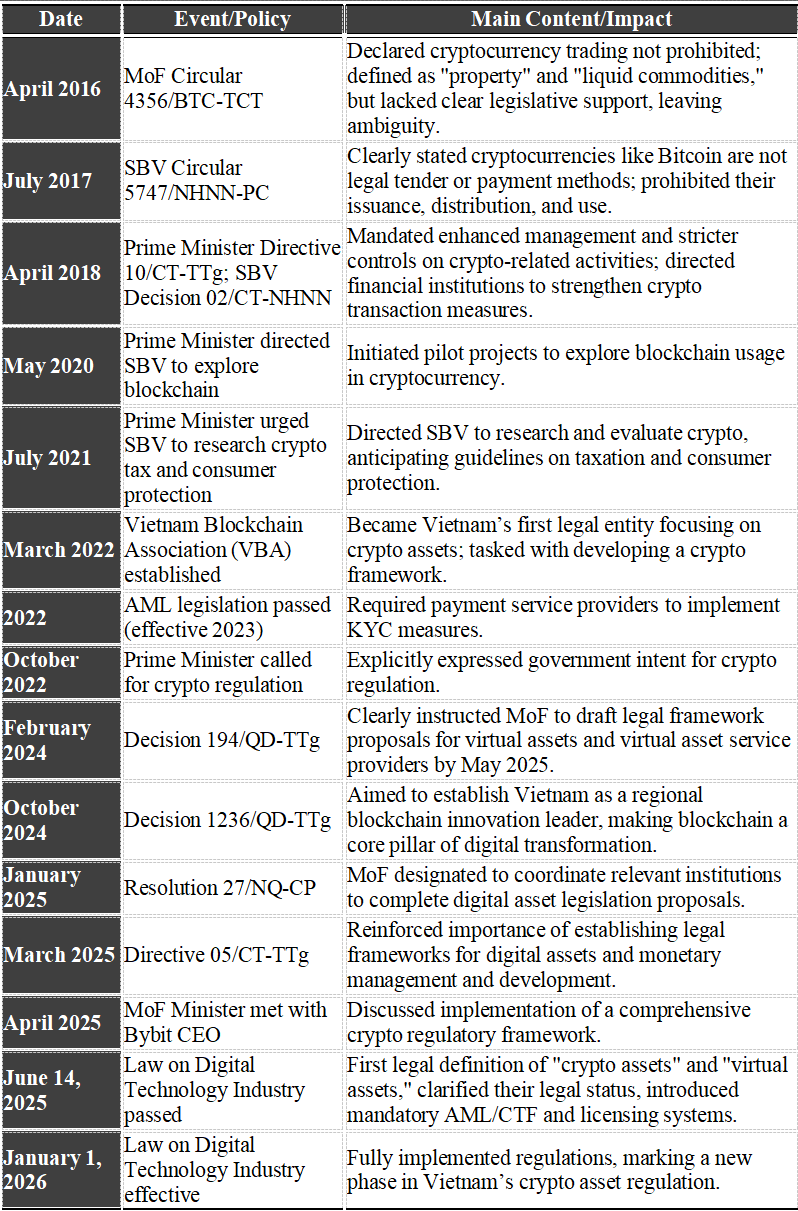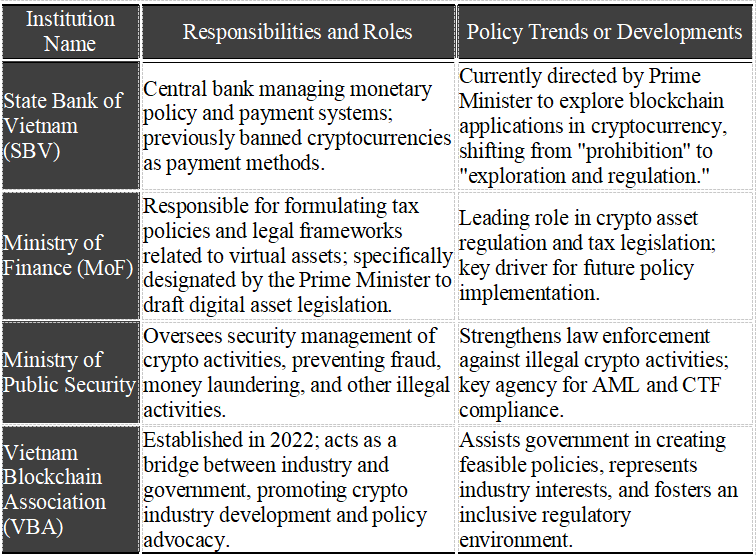
Introduction
For a long time, Vietnam’s legal stance on cryptocurrencies has been unclear, leaving tax policies in a "grey area" and market participants under constant uncertainty. However, a significant shift occurred on June 14, 2025, when the Vietnamese National Assembly passed the "Law on Digital Technology Industry." This landmark legislation formally integrated crypto assets into the national legal framework with explicit classifications, officially granting them legal status—a major milestone in Vietnam's crypto asset regulatory process.
The new law categorizes digital assets into "virtual assets" and "crypto assets," excluding securities and digital fiat currencies. It authorizes the government to establish detailed implementation regulations, emphasizing cybersecurity, anti-money laundering (AML), and counter-terrorist financing (CTF). Scheduled to take effect on January 1, 2026, the law aims to refine the legal system and align with international standards, assisting Vietnam in exiting the FATF's grey list.
This article analyzes the transformative impact of this legislation on Vietnam's digital economy, exploring the latest developments and future directions in its taxation system. It reviews the Vietnamese government's policy evolution from cautious observation to active regulatory development, compares practices from Southeast Asia and other representative countries, and forecasts Vietnam's strategies to balance risk control with innovation, predicting specific policies and their potential implications for Vietnam's emerging digital economy.
1 Vietnam Clarifies the Legal Status of Crypto Assets
Prior to the "Law on Digital Technology Industry," Vietnam’s legal classification of cryptocurrencies was ambiguous and evolving. Initially, the Vietnamese government strictly restricted cryptocurrencies as payment methods, issuing strong risk warnings. For example, in July 2017, the State Bank of Vietnam (SBV) clearly stated in Circular 5747/NHNN-PC that cryptocurrencies like Bitcoin and Litecoin were not recognized as legal tender or payment instruments, explicitly banning their issuance, distribution, and use. Violators faced administrative or criminal penalties. Subsequently, in April 2018, the Prime Minister issued Directive 10/CT-TTg, instructing agencies including the General Statistics Office, Ministry of Finance, and Ministry of Public Security to enhance management of crypto-related activities, strengthening control over related transactions to prevent potential harm.
Although the Ministry of Finance (MoF) announced in April 2016 (Circular 4356/BTC-TCT) that cryptocurrency trading was not prohibited, defining cryptocurrencies as "property" and "liquid commodities," the absence of supporting legislation created ambiguity in implementation, complicating compliance and enforcement. Additionally, under Vietnam’s 2015 Civil Code (Article 105.1), the definition of assets includes tangible goods, currency, monetary instruments, and property rights, none of which explicitly covered digital assets. This classification gap created significant legal uncertainty, directly affecting how crypto assets were managed and regulated.
This ambiguity ended dramatically on June 14, 2025, when the Vietnamese National Assembly passed the landmark "Law on Digital Technology Industry," effective January 1, 2026. For the first time, Vietnamese law explicitly defines "digital assets," categorizing them as "crypto assets" (secured by cryptography and blockchain technology) and "virtual assets" (primarily for trading and investment, excluding securities, stablecoins, and central bank digital currencies). This legislative breakthrough resolved longstanding uncertainty around crypto assets' legal status, formally recognizing them as lawful property under civil law, providing a solid legal foundation for individuals and organizations to establish and exercise property rights legally.
The strategic transition from "non-recognition" to "legalization" was intentional, driven by Vietnam’s recognition of the significant potential inherent in the crypto economy. Despite regulatory challenges, Vietnam ranks fifth globally in cryptocurrency adoption, with approximately 20.95% of the population holding crypto assets and annual capital inflows exceeding $100 billion. Concurrently, Vietnam faces international AML and CTF compliance pressures, being on the Financial Action Task Force (FATF) grey list. Legalization thus became essential for attracting investment, promoting digital economic development, and effectively regulating this emerging industry. This shift indicates that Vietnam has moved beyond risk aversion towards actively embracing opportunities offered by the digital economy, seeking to guide and regulate the new sector through a comprehensive legal framework rather than merely suppressing it.
2 Vietnam’s Reform on Crypto Regulatory System
The official shift in Vietnam's legal stance on crypto reflects significant transformations in its regulatory framework. Historically characterized by incomplete systems and passive responses, Vietnam’s regulatory approach often adopted a one-size-fits-all method. However, influenced by the global crypto surge and leadership changes, Vietnam's crypto regulatory system is rapidly improving. The country now has an initial regulatory framework with clear divisions of responsibilities and is actively pursuing various pilot regulatory programs, aiming to embrace new technologies while effectively addressing AML and CTF challenges.
2.1 Evolution of the Regulatory Framework
Vietnam's crypto regulatory framework has undergone a notable evolution, transitioning from non-existence to proactive guidance.
From 2016 to 2022, Vietnam's crypto regulatory system evolved from virtually nonexistent and "one-size-fits-all" to a stage of exploratory research.
In April 2016, the Ministry of Finance issued a circular stating that cryptocurrency trading was not prohibited, though the classification remained ambiguous. Subsequently, in July 2017, the State Bank of Vietnam (SBV) explicitly prohibited cryptocurrencies like Bitcoin as payment methods, emphasizing their illegality. In April 2018, the Prime Minister issued directives to enhance the oversight of cryptocurrency-related activities, and SBV instructed financial institutions to strengthen measures related to cryptocurrency transactions. These steps clearly demonstrated the government’s early caution and risk prevention stance.
In May 2020, the Prime Minister directed SBV to initiate pilot projects to explore blockchain applications in cryptocurrencies and required studies assessing the pros and cons of cryptocurrency. In March 2022, the Vietnam Blockchain Association (VBA) was established as Vietnam's first legal entity focused specifically on crypto assets, tasked with creating and nurturing a cryptocurrency development framework. In the same year, Vietnam passed Anti-Money Laundering (AML) legislation, effective in 2023, mandating Know Your Customer (KYC) procedures for payment service providers—an essential step in international compliance. In October 2022, the Prime Minister reiterated calls for cryptocurrency regulation, highlighting the government's urgency for normalization in this area.
After 2023, especially following leadership changes in 2024, Vietnam gradually softened its regulatory stance on cryptocurrencies.
In February 2024, through Decision 194/QD-TTg, the Prime Minister instructed the Ministry of Finance to draft a legal framework for virtual assets, demonstrating a clear governmental commitment at the legislative level. In October 2024, Decision 1236/QD-TTg was signed by the Prime Minister, launching the "2025 Vietnam National Strategy for Blockchain Technology Development and Application," looking forward to 2030, aiming to establish Vietnam as a regional blockchain innovation leader. This strategy explicitly identified blockchain as a central pillar for digital transformation and emphasized “Made-in-Vietnam” blockchain platforms, underscoring the government's recognition of blockchain and digital assets as key drivers for the nation's digital economy growth.
In June 2025, the Law on Digital Technology Industry was passed, establishing a tolerant yet prudent regulatory framework through clearly defined classifications of digital assets (crypto assets and virtual assets), mandatory AML and Counter-Terrorist Financing (CTF) measures, introduction of licensing systems, and incentives for emerging technologies such as artificial intelligence, semiconductors, and advanced computing, thus promoting broader digital economic development.

The maturity of the regulatory framework, transitioning from passive responses to proactive guidance, is a key characteristic of Vietnam's evolving digital asset policies. Initially, Vietnam's crypto regulations primarily involved "prohibition as payment methods" and "risk warnings," a passive and preventive stance. Recently, with directives from the Prime Minister, the establishment of the Blockchain Association, and the enactment of the "Law on Digital Technology Industry" and national blockchain strategy, regulatory focus has notably shifted to actively constructing frameworks. Integrating crypto assets into national digital economic strategies demonstrates Vietnam's entry into a more mature and pragmatic regulatory phase, aiming beyond mere risk control to foster innovation, attract investment, and enhance its global digital economic positioning.
2.2 Overview of Vietnam’s Current Regulatory Structure and Responsibilities
Vietnam’s current crypto regulatory framework involves multiple ministries with distinct responsibilities, forming a loosely coordinated regulatory structure. Key institutions, including the State Bank of Vietnam (SBV), Ministry of Finance (MoF), Ministry of Public Security, and Vietnam Blockchain Association (VBA), collaboratively build and refine this regulatory framework. See Table 2 for specific roles and responsibilities.

2.3 Regulatory Sandbox Pilots and Risk Compliance Under New Norms
To explore innovative digital asset applications under controlled risk conditions, Vietnam actively introduces regulatory sandbox mechanisms and pilot projects.
Vietnam is considering establishing regional and international financial centers, with key initiatives involving controlled testing policies (sandboxes) for fintech, particularly business models involving crypto assets and cryptocurrencies. These sandbox mechanisms allow small-scale tests of new financial technologies and business models in controlled environments, evaluating potential risks and benefits before broader implementation. For example, Da Nang has been authorized to trial special mechanisms, including using stablecoin (USDT) for international tourist payments, viewed as an important attempt to explore digital payments in tourism. These pilot projects aim to accumulate practical experience and provide data and references for future comprehensive regulatory frameworks.
Furthermore, Vietnam is actively exploring the development of a Central Bank Digital Currency (CBDC)—the digital dong. The Prime Minister has repeatedly called on SBV to study the pros and cons of digital currencies and initiate blockchain-based cryptocurrency pilot projects. While digital dong issuance is still under evaluation, its potential legal status and supplementary role to the traditional financial system are vital components of Vietnam's digital economic development.
Meanwhile, AML and CTF compliance remains central to Vietnamese authorities' concerns, especially after being placed on FATF's "grey list" due to deficiencies in crypto-related AML practices. Being grey-listed indicates strategic shortcomings in combating money laundering and terrorism financing, potentially affecting Vietnam's international financial reputation and foreign investment attraction. To be removed from the grey list, Vietnam must establish policies for virtual asset management and strengthen related law enforcement.
The passage of the "Law on Digital Technology Industry" is a crucial step for Vietnam to address FATF pressures, mandating stringent AML/CTF measures to enhance security and transparency. Future crypto exchanges and service providers will likely be required to comply with global KYC and AML standards and possibly maintain compensation funds to protect users from cyberattacks, thereby reducing financial crime risks.
3 Vietnam’s Crypto Taxation Policies and Recent Developments
The evolution of Vietnam’s crypto taxation policies has closely followed the country's regulatory stance on cryptocurrencies. In the early days, unclear and conflicting definitions from Vietnamese authorities, coupled with crude, blanket regulatory measures, made it impractical to implement taxes on cryptocurrency transactions. However, the rapid surge in crypto trading volume forced the government to reconsider its legal stance, prompting Vietnamese authorities to seriously study cryptocurrency taxation, especially from 2024 onward, when the urgency of establishing a clear legal framework became particularly pronounced.
3.1 Crypto Transactions in Vietnam Remain in a Tax Grey Area
Due to the absence of clear legal definitions and a comprehensive regulatory framework, cryptocurrency transactions in Vietnam have long lingered in a tax grey area. As previously mentioned, although the Ministry of Finance’s Circular 4356/BTC-TCT in April 2016 declared cryptocurrency transactions as permitted, classifying crypto as “property” and “commodities,” it lacked specific taxation guidelines. The situation was further complicated when, in July 2017, the State Bank of Vietnam (SBV) clearly stated in Circular 5747/NHNN-PC that Bitcoin and other cryptocurrencies were not recognized as legal tender or payment methods, exacerbating legal uncertainty and making it difficult for tax authorities to effectively impose taxes on cryptocurrency activities. Furthermore, Vietnam’s Civil Code of 2015 did not include digital assets under its definition of property, presenting significant hurdles for crypto taxation enforcement.
Compared to Vietnam’s clearly defined stock trading taxation system, cryptocurrency activities have remained exempt from tax obligations for a considerable time. This scenario essentially positioned Vietnam as a de facto "crypto tax haven," attracting substantial crypto investments but simultaneously creating significant gaps in tax revenues for the government.
3.2 New Regulations Provide a Legal Framework for Crypto Taxation
The Law on Digital Technology Industry, set to officially take effect on January 1, 2026, marks a pivotal step forward in Vietnam's approach to cryptocurrency taxation. While the law does not directly impose taxes on cryptocurrencies, it provides the legal foundation necessary for future taxation frameworks. Although it excludes securities, stablecoins, and Central Bank Digital Currencies (CBDCs), this landmark legislation introduces clear definitions for "crypto assets" and "virtual assets" for the first time within the Vietnamese legal system. This historic clarification transforms cryptocurrencies from a legally ambiguous asset class into potentially recognized legal property. Once officially acknowledged as lawful property, cryptocurrency transactions and activities may soon fall under existing tax regulations, including Value-Added Tax (VAT), Corporate Income Tax (CIT), and Personal Income Tax (PIT).
Against this backdrop, the Ministry of Finance is finalizing a resolution draft on pilot programs related to cryptocurrency issuance and trading. The pilot will evaluate the applicability of VAT, CIT, and PIT to crypto asset transactions. This trial will be conducted on a limited scale, closely supervised by national regulatory bodies, to determine appropriate methods of income recognition for crypto assets, thus establishing transparent regulations, mitigating budgetary losses, and safeguarding investor rights.
Regarding proposed tax rates, discussions continue among authorities and industry stakeholders. One proposal suggests adopting a trading tax of 0.1% for crypto transactions, mirroring stock market practices, as a reasonable rate generating substantial revenues without excessively dampening market activity. If cryptocurrencies are classified as investment assets, trading profits may be subject to capital gains taxes, similar to those applied to stocks or real estate. Businesses involved in cryptocurrency trading could potentially be required to pay the standard 20% Corporate Income Tax. Moreover, there are suggestions to impose a 5-10% Personal Income Tax on profits from Non-Fungible Tokens (NFTs), apply withdrawal fees ranging from 1% to 5% on foreign investors’ profits, grant pilot exchanges a preferential 10% Corporate Income Tax rate for the initial five years, and waive VAT on digital asset transactions to enhance market liquidity.
4 Outlook on Vietnam’s Crypto Policy
Vietnamese authorities' stance towards cryptocurrencies has transitioned significantly from initial caution and restrictions to a more proactive exploration and structured regulatory approach. This shift reflects a pragmatic balancing act between managing financial risks—such as money laundering and fraud—and seizing opportunities offered by digital economic growth. Authorities may have recognized that outright prohibition or disregard of crypto assets risks causing an exodus of talent and capital, missing out on opportunities to carve out a niche in the global digital economy. Indeed, Vietnam has already listed blockchain technology, digital assets, and cryptocurrencies alongside cloud computing and artificial intelligence as strategic national technologies. This indirectly indicates that Vietnam regards digital assets as essential drivers for national digital transformation and economic growth.
Given current development trends and clear governmental signals, there is good reason to believe Vietnam’s future crypto asset policies will continue to embody a spirit of "inclusive prudence." Specifically, future crypto policy directions in Vietnam can be anticipated as follows:
Firstly, additional regulatory guidelines will be introduced and implemented. With the Law on Digital Technology Industry coming into force, supplementary regulations and guiding opinions will be established, clearly outlining licensing requirements for crypto asset service providers, operational standards, and consumer protection measures. Regulatory sandboxes will remain integral, providing controlled environments to test new business models and technologies, accumulating experiences, and refining long-term regulatory frameworks to ensure innovation is balanced with risk management.
Secondly, taxation frameworks will progressively solidify and become operational. After the new law takes effect, the Ministry of Finance is likely to expedite the introduction of detailed tax guidelines, specifying taxation methods, rates, and collection procedures for various crypto-related activities. Successful tax practices from e-commerce platforms may be replicated within crypto trading platforms, enhancing tax efficiency and compliance. Vietnam may also consider differentiated tax policies for different types of crypto activities, combining capital gains taxes and transaction taxes to achieve fairness and effectiveness in taxation.
Thirdly, digital assets will gradually integrate with the traditional financial system. Vietnam's government will continue promoting the integration of digital assets with traditional finance, exploring possibilities such as crypto banks, national crypto exchanges, and stablecoin development, to build a more modernized financial infrastructure.
In summary, Vietnam is positioned to become a model for "compliant innovation" in Southeast Asia’s crypto economy, competing with Thailand and Malaysia for regional crypto market leadership. Vietnam possesses a large crypto user base and a relatively clear strategy for digital economic growth. The recent passage of the Law on Digital Technology Industry, combined with ongoing taxation pilot programs and sandbox mechanisms, signifies Vietnam’s shift from a "grey area" towards clear and regulated practices. This transformation will help Vietnam stand out as a market capable of both embracing innovation and ensuring compliance. Vietnam's experience may offer a practical blueprint for other emerging markets and developing countries on how to gradually establish comprehensive crypto regulatory and tax frameworks without stifling innovation, thereby converting the crypto market's potential into a tangible driver of national economic growth